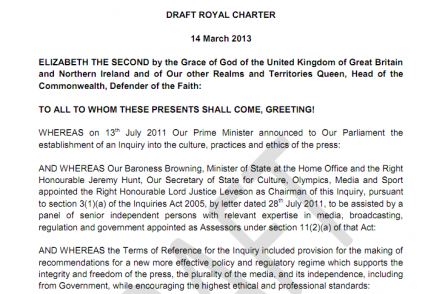
The Privy Council revealed today that it has rejected a Royal Charter on press regulation submitted by publishers body Pressbof because it falls short in several key areas from the recommendations in the Leveson report.
The Council (which is a committee of Government ministers) said it could not accept that publishers should play a “significant role” in both funding and appointing the Recogition Panel which would effectively licence any future press regulator.
It has also rejected the Pressbof proposal because, unlike the Parliament-backed scheme, “there would be nothing to stop the Government amending the charter in future”.
Under the Parliament-backed press regulation Royal Charter, a two-thirds majority of both houses of Parliament is needed to amend it.
The Privy Council also expressed concern that the provision of a libel arbitration service was only optional under the Pressbof scheme. And it has questioned whether the Pressbof plan would deliver a “robust standards code”.
On apologies, the Privy Council said it was not convinced that under the Pressbof scheme “the self-regulator will have the necessary power to require a relevant publisher to direct apologies”.
The Privy Council also expressed concern that under the Pressbof charter, the regulator would not give sufficient attention to third-party complaints from lobby groups and others not directly involved in a particular story. Pressbof said that such complaints should only be considered when the “alleged breaches are significant and there is a substantial public interest”.
The Council said that its public consultation suggested the Pressbof charter “was not seen to have credibility with the public”. It received some 19,400 responses to its consultation, 19,000 of which were negative (mostly generated by campaign group Hacked Off).
Recognising industry concerns that free libel arbitration could lead to a surge in expensive claims against regional publishers, the Privy Council said that more work will be done in this area: “Any system needs to be sustainable, not only for the industry but also for the public. The committee considers that this issue should be given further consideration.”
The Pressbof Charter was ultimately supported by all national newspaper groups with the exception of Guardian News and Media which, the Privy Council said, did not express an opinion either way.
The Privy Council is now set to press ahead with the approval of an amended version of the Royal Charter on press regulation agreed between the three main political parties back in March and which addresses all the shortcomings it has identified.
Email pged@pressgazette.co.uk to point out mistakes, provide story tips or send in a letter for publication on our "Letters Page" blog
